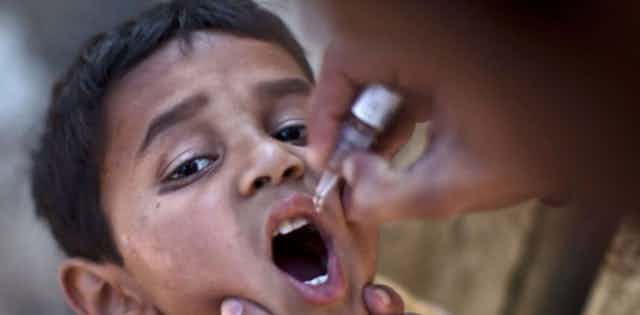The overseas aid budget is coming under attack, both in the UK and the USA. But that shortsighted view does not take into account how working together to help communities suffering under the shadow of terrorism can actually help us combat extremism. Our research illustrated how money raised in north-west England changed the lives of people in north-west Pakistan by advancing nutrition and providing health care.
Poverty, poor health and global security concerns all come together in north-west Pakistan. The region of Khyber Pakhtunkhwa has hosted large numbers of internally displaced peoples for decades, largely refugees from Afghan conflicts. Many live in camps or work as labourers on brick kilns. Complex kinship relations and the proximity to the border with Afghanistan and other troubled places – such as the Federally Administered Tribal Areas – renders this a volatile region exposed to Taliban infiltration and Pakistan armed forces activity.

Local and global security
It is in this challenging part of the world that an interesting example of partnership working between the UK and Pakistan is taking place that shows a way towards improving the well-being and economic prospects of the population. And we argue it may also, in a small way, assist in improving global security by enhancing local stability.
The initiative we worked on was a collaboration between a UK-based charity, The Abaseen Foundation and its partner NGO in Pakistan. This UK charity raises funds for health, education and development work in this region. The active NGO has over the years equipped and managed a hospital unit at Nahaqi, provided disaster relief following devastating floods and earthquakes, opened a number of schools and supported the education of the poorest among the community – including girls. The work in this particular area is crucial as girls are not usually educated unless they belong to a well-off family.
The partnership has developed a healthcare unit and school serving the peoples of a brick kiln community in Baghbanan, work which was supported with a large grant form the Department for International Development. This project focused on promotion of gender equality, improving maternal health and reducing child mortality. It used innovative approaches, including micro-finance for pregnant women. This is when a charity or NGO gives poor people money as they cannot access established banks or loans. In the developing world such funds have been made use of to address gender inequalities, empowering women by providing money directly to them.
An independent review of the project noted the “enormous impact” it had in providing access to previously absent health services for marginalised peoples and – importantly – thoroughly engaging the support of the community to create a sustainable legacy. The project built upon a previous Wellcome Trust funded project that used community engagement as a vehicle for ensuring take-up of public health messages regarding iodised salt. The local diet is lacking in iodine, which is an important nutrient for growth and development. There has been a national campaign promoting supplemented salt, but this had not necessarily changed consumption of the ordinary cheaper salt used in cooking. The local Jirga (traditional meeting organised for community decision making) helped get the message across and implement the vital changes.

Abaseen’s work represents an exemplar of the effective management of overseas aid funding. The independent review stated “this is a replicable project that could go to scale in a range of locations including with the most marginalised communities”. This success was achieved despite being in a highly unstable region where official and informal corruption is a fact of life. Yet such threats were overcome through careful project governance and community engagement.
Despite the fact that projects such as this one demonstrate the value of well-managed aid in developing sustainable local resources, the very idea of overseas aid is vulnerable to political posturing that denies its value or discredits spending at times of austerity at home. Such calls can be even more shrill when the beneficiaries are in distant lands that are riven with conflict and appear to be at the forefront of exporting terrorism and anti-Western sentiments.
Peace and security
We believe that success stories like this offer a challenge to the rhetoric surrounding the future of overseas aid. A case can be made that spending on aid rather than war may be more productive for peace and security. Interestingly, most of the Abaseen Foundation fundraising takes place in the north-west of England, in towns that are swept up in the current discourse surrounding Brexit and immigration.
Real human connections have been made in the course of UK fundraising that in some way challenge a tendency to view cultural difference as alien and other, instead forging feelings of compassion and solidarity. For example, positive connections have been made between children in UK schools and those in Pakistan.
In this way, the work of the charity may be some sort of antidote to alienation – promoting and capitalising on shared affinities for a more internationalist and less insular outlook.

